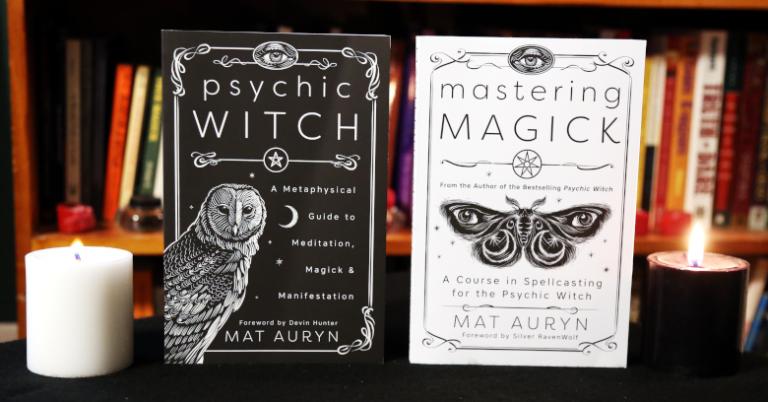Mat Auryn posted a quote from his book Psychic Witch on Facebook last week. I’m going to include the whole quote here:
One of the biggest pitfalls I find when someone begins pursuing psychic development is that they try entirely too hard. I don’t mean that they’re putting too much effort into the development itself. What I mean is they tend to try to force the unfolding of psychic ability by pushing themselves too hard with the exercises, techniques, and meditations. Psychic ability relies on a mentally relaxed state of detachment. A flower doesn’t bloom through being pried open by force; likewise, psychic receptivity cannot be achieved through strain. Psychic receptivity comes with a state of mental passivity while simultaneously staying focused and open. We open ourselves up through relaxation. We want a focused flow, not force.
I should point out that Psychic Witch is now one of Llewellyn’s Ultimate Best Sellers with over 200,000 copies sold. That status is well-earned – Psychic Witch is simply the best resource available for learning basic magic and energy work.
What Mat talks about with psychic development is also true of working spells and other magic – we don’t get magical results with brute force and determination. It’s true of devotion and building spiritual relationships – we don’t experience the Gods and other spirits first-hand by begging (or demanding) that they show up for us.
Of course, sometimes that’s exactly what happens. We have a great need and the intensity of our desire powers the spell to an amazing completion. Or we pray fervently to a God – perhaps even a God we’ve never spoken to before – and They show up and grant us a bit of Their grace.
But that level of passion is impossible to maintain for very long, much less to repeat at will. And it doesn’t work every time. Most times it ends up being what Mat calls prying a flower open by force – you interrupt a natural process and prevent it from continuing. Or – as happened to me once – the deity in question says “who are you and why should I give you anything?”
With both magic and devotion, patience is required. Now, I’m not a patient person. Doesn’t matter what it is, I want it now. And if I can’t have it now I want to know exactly when I can have it. But it doesn’t work that may, and impatient though I may be, I have to deal with reality.
The worst outcome is that impatience leads to failure, failure leads to discouragement, and discouragement leads to abandoning spiritual practices that we know are meaningful and helpful.
And then someone whose idea of spiritual depth is a cheap self-help book says “if you really wanted it you’d find a way to get it” which makes things even worse.
It doesn’t have to be this way. We just have to approach our magic and our devotion in a healthy and helpful way.
Expect that it’s going to work, eventually
And by “work” I mean getting the outcome you’re hoping to get.
Obtaining something by way of magic is a very different thing from building a respectful, reciprocal relationship with a God or other spirit. The first is inherently transactional. The second is not. But they’re similar because of the way we go about them: using non-tangible means to achieve a very real result. And so an approach that will help you be successful with one will also help with the other.
That begins with expecting that it’s going to work, sooner or later.
Magic isn’t powered by belief, like some vampire movies that say a cross will repel a vampire, but only if your faith in the Christian God is strong enough. Magic works based on action – do the spell right and you’ll get results.
But some research (and increasingly, my own experience) says that people who believe in magic get better magical results. I’m trying to work through what that means, but for our purposes here it’s enough to say that if you expect the process (whether magical or religious or both) is going to work, you’re more likely to do it carefully and diligently – not to mention more likely to do it at all.
If you expect that it’s going to work, you’re less likely to give up when the results you want don’t show up right away. You’re more likely to keep studying, keep practicing, and keep doing the kinds of things that will make you more successful in the future.
Expect that it’s going to work.
Have no expectations about it working now
At the same time, do not expect it to work today. Or tomorrow. Or at any other specific time.
Part is this is psychological. If you expect that something good will happen sooner or later, you’re hopeful. And as the story of Pandora’s Box teaches, hope is essential for humans to survive and thrive.
But another part flows from the Witches’ Pyramid, the four-sided philosophy of magic first articulated by Eliphas Levi in the 19th century. This deals with the fourth side of the pyramid: “to keep silent.”
This isn’t about secrecy. This is about giving your magic time to work. It’s about not opening the metaphorical oven door every five minutes to see if the cake is rising, or digging up newly-planted seeds to see if they’ve sprouted.
Much of magic works through the subconscious. Keeping silent – and not constantly checking the calendar, much less a stopwatch – gives your subconscious the room it needs to work without being interrupted.
And also, my success with getting timing right – whether with spellwork or with divination – isn’t great. I sometimes say “time runs differently in the Otherworld” – which it does, and all of my magic draws at least a little from the land of the Gods and ancestors. But it may be that “when” is inherently more uncertain than “what.” Or it may just be that I’m bad at this.
Now, at some point, Rey has to accept that her parents aren’t coming back to Jakku. At some point, further waiting is just procrastination and you need to do something else, either with magic or with mundane effort or with both (likely both). Figuring out when that is can be difficult – divination can be helpful here.
But until you’re sure it’s time to try something else, hold no expectations for when what you’re looking for will happen.
Recognize your successes
I wrote a whole post on this earlier this month: Learning To Recognize Your Magical Successes. That post stands on its own.
It’s important to recognize when our magic works. We need to celebrate our successes, in part so we can enjoy them. But also, recognizing our successes reminds us that what we did worked one time, so it’s likely to work a second time. Over time, success after success builds confidence – and confident people are much less likely to get discouraged.
Keep practicing regularly
The foundational devotional practices of prayer, meditation, and offerings are common across many traditions across the world. If you’re doing them reverently, it’s almost impossible to do them wrong. You may need or want to tweak your approaches, but if you’re doing these things and you’re still not hearing from your favorite Goddess, keep doing them.
It took me five years from the time I got serious in my Pagan practice until I had an experience of a God that was strong enough I couldn’t rationalize it away. It was another three years before it happened again. After that, the experiences started getting stronger and more frequent.
Keep practicing, whether you get good results, bad results, or no results.
The foundational magical practices that Mat teaches in Psychic Witch and his follow-up book Mastering Magick are not new. Some of them I learned from books (especially Laurie Cabot’s Power of the Witch) and a few I discovered intuitively. They work. If you’re doing them and not getting the results you want, keep doing them.
I’ve been practicing magic for 30 years now. There are some things I’m pretty good at. There are others where I’m less skilled. But even in those areas where I get reliably good results, I have room to learn and grow.
Keep practicing. The results will come in their own time.
Perseverance is a virtue
As someone who grew up with “allow six to eight weeks for delivery” I am continually amazed at the near-instant fulfillment we have now. Some things I can get delivered in a few hours. Most things I can get in a day or two. I love it, but it sets unrealistic expectations in other parts of our lives.
Magic doesn’t happen overnight. Relationships with other humans aren’t built in a day and neither are relationships with Gods, ancestors, and the spirits of the land where we live. We can’t allow ourselves to get discouraged if we don’t get the results we want as quickly as we’d like to have them.
But maybe you are discouraged. That’s OK – we feel what we feel. There’s no reason to beat yourself up and feel even worse.
As always in these matters, the question is “what are you going to do now?”
Expect that it’s going to work eventually and you’ll see there are not so many reasons to be discouraged. Expect that it’s not going to work today and you won’t be disappointed when it takes longer than you expected, or longer than you had hoped. Recognize your successes, no matter how small… or how large. Sometimes large successes are harder to accept than the small ones.
And whatever you do, keep practicing.
Virtues are those qualities that over time have been shown to be helpful. Hope is a virtue. Patience is a virtue. Perseverance is a virtue. Incorporate these virtues into your life.
Keep practicing.
The results will come.















